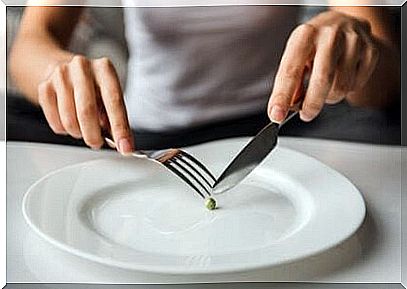Orthorexia: The Obsession With Healthy Food

Eating foods low in saturated fat, cholesterol, salt or sugar is one of the classic medical advice. However, the obsession with every milligram of food brought to the mouth, known as orthorexia, in addition to being unhealthy, can conceal an underlying mental disorder.
The most difficult aspect of these cases is identifying the symptoms. People with this eating disorder appear healthy, so it is very difficult to know when they cross the line that separates a correct habit from another harmful. The question, then, is: what is the line?
What is a healthy diet?
Eating healthy means enjoying complete, varied and balanced nutrition. There is no food that contains all the nutrients the body needs, therefore it is important to include the distinct food groups in our meals (fruit, vegetables, cereals, meat…). They are all indispensable and must be taken in the quantities that the body needs.
For this reason, it is very healthy to vary your diet and try to include everything. Only in this way will we be able to provide the body with the energy it needs every day and ensure its optimal functioning.
How can healthy eating be unhealthy?
Anything taken to the extreme can be harmful. In this case, even if a priori eating healthy is a “pseudo-healthy” behavior, if you live according to it, it becomes an obsession. The pathology associated with this conduct is orthorexia. She was first defined in 2000, although to many she is still a complete stranger.

This behavioral disorder is characterized by the development of extremely rigid eating habits, based on a control of the nutritional components of foods and the demonization of certain foods.
People with orthorexia consume only products from organic farming, i.e. free of transgenics, chemicals, pesticides or herbicides. Their menus, therefore, include only natural foods without preservatives, sugars and any type of fat.
To give us an idea, orthorexics refuse to eat a slice of raw ham because of its fat. They can also disdain a tomato salad if they are not organic.
Although the World Health Organization (WHO) does not recognize orthorexia as a disease, its course has strong implications for a person’s physical and psychological well-being. The studies carried out in this regard have come to the conclusion that, at the basis of the obsessive meticulousness, there is a mental disorder.
Serious health implications
Eating disorders are usually progressive. If at first the person stops eating industrial confectionery and processed products, later, if he develops the disorder, he will eliminate necessary nutrients from his diet, such as legumes, meat or non-organic vegetables.
The subject becomes more and more demanding and rigid with everything that has to do with food. It will suppress additional food groups that it does not adequately replace with others, which in the long run results in severe deficiencies of essential vitamins or minerals. If the problem manifests itself in its most severe form and the obsession cannot be controlled, there is a good chance that the person will end up undernourished.

As a result of this inadequate diet, the person presents fatigue and tiredness and is more vulnerable, contracting diseases more easily. In fact, his immune system is compromised by a reduction in sodium levels in the blood, as well as in platelets, white and red blood cells.
In addition to these physiological consequences, as regards the psychological level, the subject has high levels of dopamine and low levels of serotonin, manifesting anxiety combined with an excess of euphoria.
How to identify a food problem?
Orthorexic people usually spend hours on the millimeter planning of their menus. Everything they ingest is analyzed and they avoid eating any food that has not passed their strict quality controls. If they transgress under any circumstances, they feel strongly guilty.
They tend to isolate themselves socially. Not knowing the composition of the dishes in restaurants prevents them from going out to eat. In order not to experience this lack of control, therefore, they always end up cooking by themselves.
These people are unlikely to be able to enjoy food, as they focus more on the quality of what they ingest than on the smell, taste or texture. However, people with orthorexia are reluctant to acknowledge that they have a problem. In part this is due to the great social consensus of people who follow a “healthy lifestyle”.
The psychological profile of people with orthorexia
People more prone to developing obsessions usually have very characteristic personality aspects. In this case, those who are obsessed with how much and what to eat also have a high need for control in other aspects of their life.
This obsession with control often leads to anxiety. An anxiety that can be faced in very different ways: the classic one is “attacking the refrigerator”.
They also manifest excessive perfectionism in all aspects of their life (work, family, social …), accompanied by high levels of anxiety. The their friends and acquaintances to define strict people, meticulous, very inflexible and intransigent.
Relation to classical eating disorders

In addition to the risks already exposed, orthorexia can also represent the gateway for certain eating disorders, such as anorexia. Although there are many similarities, the differences between the two pathologies are evident. Patients with anorexia are afraid of gaining weight and their conception of their body is altered. Therefore, they are not obsessed with the natural origin of a food, but with the quantity of calories and fats present in it.
Maintaining a healthy diet offers numerous benefits. Among these, it allows our weight to maintain a healthy relationship with our height, helps us to keep cholesterol under control or to prevent certain cardiovascular diseases. All these benefits, however, wear off when food control becomes an obsession.








